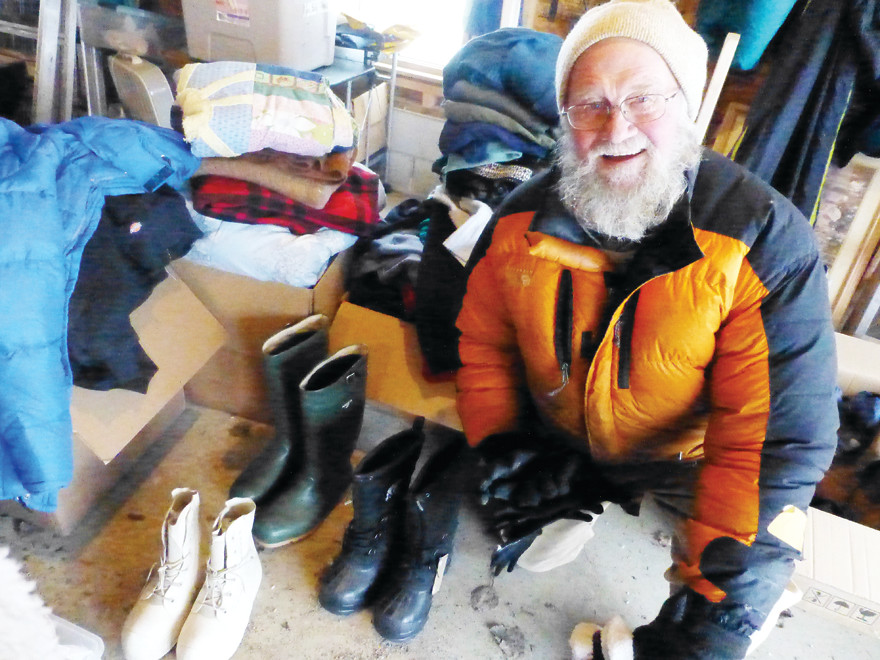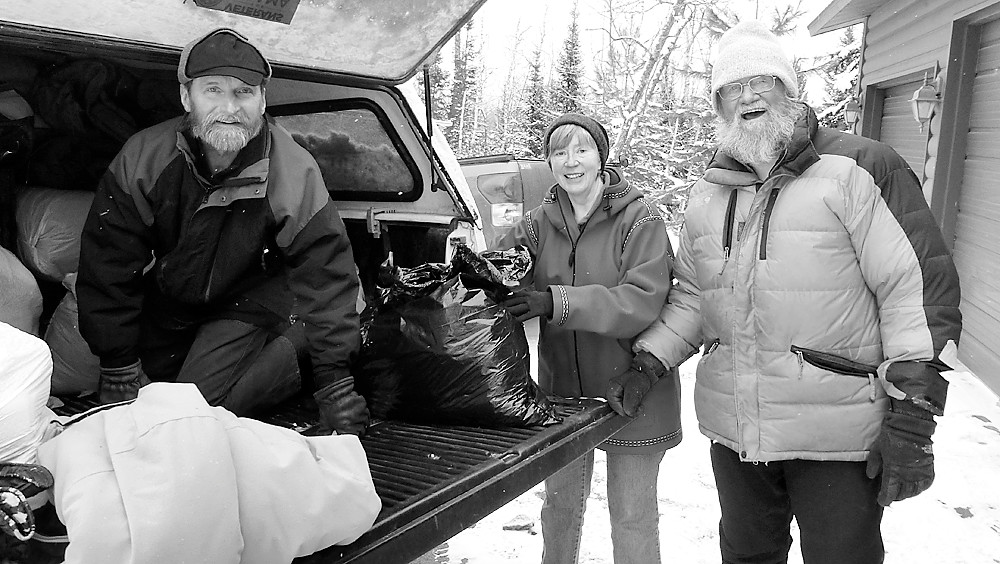Support the Timberjay by making a donation.
Warm hearts and cold toes
Ely donations a vital help at Standing Rock
STANDING ROCK - “This is the best donation of real cold-weather gear this camp has ever received! Yeah, Ely! Thank you!” A man in dreadlocks grinned at Kim McCluskey as they sorted parkas, boots, sleeping bags and sweaters.
Earlier this month, McCluskey drove a truck full of donations from Ely to Bismarck, North Dakota. Early the next morning, he followed little-known roads to find the camp because the police had barricaded the main road.
“I could hardly see the road,” he said. “There was nothing as far as the eye could see except snow that blew constantly, an undulating white mist that goes and goes.”
On Tuesday, as the winter sun rose, McCluskey drove his old pickup into the Standing Rock camp. “I came over a rise and there’s the camp, right below me. It startles you,” he said. “There were more than 100 tipis and all sorts of tents, some old canvas ones, some high tech ones. The soft smoke rising from the tops of the tipis was breathtaking.”
At the gatehouse, a bearded guard named George met him. They stopped at a large green tent. Around it, in drifted snow were untouched bags of light clothing like T-shirts.
“T-shirts are useless for the cold they’re facing,” McCluskey said. “There are people in the camp who are dressed wrong. Any Iron Ranger would see it right away. They need real winter coats, real gloves. I told DJ, the man in charge of receiving donations, that we know cold in Ely. Boy, you should have seen his face change as he went though the donations! Pretty soon people were coming from everywhere, really excited to get the heavy weather gear.”
The three donated woodstoves were taken by vets who are building winter shelters. Vets come in every day needing gear for the bitter cold.
“There was just a feeling that I got right away—deep caring, comradeship. The feeling was almost overpowering. You looked around, people were moving around, some laughing and joking. I kept looking around and just going ‘wow’. I thought how brave these people were to be out here in the cold. There are troops on the road, on the bridge. Helicopters go over. Here is this band of unarmed people in the valley. No one in camp ever said one bad thing about the cops. But many talked about protecting the water.
“The people in camp appeared not to focus so much on the pipeline but seemed more to feel that they were protectors of the water,” he said. “All over the country and the world, water is being contaminated by big corporations. Mining, oil pipelines and industrial waste is slowly destroying one thing we cannot live without. Those people who have taken it on to protect this resource have little to gain personally. What they do is for the protection of the human race.”
When McCluskey said to his guide, “You’re doing a good job,” George shook his head. “No, Kim. You, me, all of us—We’re all doing a great thing together.”
McCluskey came away shaken. “If, when I die, I can take a few special memories with me, visiting that camp will surely be one of them. The human spirit is so strong to stand up against such great odds and not give up, not back down. If there is anything to be won, it will not be done with laws but with love.”
McCluskey met a small Native American woman named Alex. She had been on the front lines protesting the pipeline and was hit with water cannons and pepper spray. She grinned. “Even though I was wet and everything, I had on my Steger mukluks and my feet stayed warm and dry.”
McCluskey smiled. “They walked right into this stuff. They were so brave! We’re not alone in Ely, wanting to keep our water pure. It’s happening all over the world. It’s the same battle. Big business is polluting our waters and our pure waters are getting less. The water protectors is a new breed and it’s an issue all over the world.”
McCluskey also carried spiritual gifts from Nancy Scheibe of Ely and gave them to one of the Native American spiritual leaders.
“The part I really like is seeing everybody come together,” he said.
Donations came from all the people of Ely, he said. “Nobody was worried about if you were a local or your political preference. What everybody felt was that they knew what the suffering in the cold was. That’s the language we all speak, we all feel that compassion, we responded as a community to suffering and that’s what it’s all really about.”
“What you realize is that people are good and the people want to help when they see catastrophe and suffering. But often there’s just not a way for them to help.”
Two Ely widows proved how deeply this project touched people. The first woman offered him a huge, heavy-duty parka, wool shirts and heavy pants. “My husband’s been gone twelve years,” she said. “I just wasn’t ready to let his warm things go. But for this…. Well, I just know it’s what he would want.” The second widow echoed her. “I just haven’t been able to give away his things. But he was a big man. They’ll need warm things for men his size. It’s time.”
“In the end, I felt both sides were suffering,” McCluskey said. “It’s the same in every conflict, every war.” On the way he had stopped in Bismarck, where the law enforcement officers were staying in hotels. “When I pulled into the parking lot, I noticed the state trooper patrol cars and some black vehicles with tinted windows. As I entered the lobby there were two officers and a couple of men who appeared to be ex-military. Even with my happy “hi,” there was no friendliness. By the time I left the next morning, I encountered several of the enforcement officers and their heavy, serious, almost angry persona was always there. At the camp, instead, I met happy smiling faces. As we talked about the donations, we laughed and hugged. The feeling of love seemed to saturate all I met. I realized that although it was compassion for this band of brave, peaceful protectors that drew me here, the law enforcement officers on the bridge needed compassion too. That love we share is who we really are. Anyone who doesn’t live that truth suffers. I saw it all in a new light. I pray that all of us find that place beyond our differences, where we can genuinely reach out to everyone we meet.”









